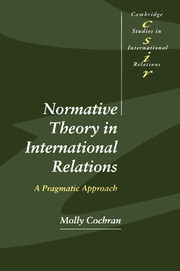Introduction
Published online by Cambridge University Press: 22 September 2009
Summary
All theory in International Relations (IR) is normative theory. By this I mean that even those engaged in positivist approaches, who aim to study world politics in a manner that resembles as closely as possible the methods of natural science, cannot avoid normative assumptions in the selection of what data is important, in interpreting that data, and in articulating why such research is significant. There was a time when such a statement would have been highly controversial. For some approaches within IR it is still controversial today. However, powerful criticisms of the positivist bias towards explanation, objectivity and the fact/value separation, have been unleashed in IR that take the radical edge off of this opening statement. I begin in this way to make the point that, while all theorizing in IR has normative concerns that can be brought to the surface for critical examination, not all theory in IR is self-consciously interested in such an exercise, nor finds it to be an important aspect of theorizing in the discipline.
Therefore, for the purposes of this book, we must have available some criteria for determining what defines normative IR theory as a field. For example, a writer such as Hans Morganthau (1954) could be regarded as a normative theorist, since he holds the view that the Stateman has moral responsibilities to his citizens to clarify and pursue the national interest, and responsibilities to other states, even when in pursuit of the national interest, to demonstrate restraint with regard to the infliction of death and suffering in particular circumstances.
- Type
- Chapter
- Information
- Normative Theory in International RelationsA Pragmatic Approach, pp. 1 - 18Publisher: Cambridge University PressPrint publication year: 1999

